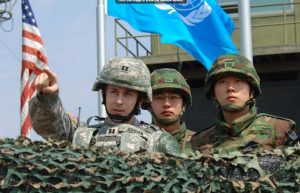By Dave Lindorff

Media news reports and commentary as well as political statements coming out of Washington on the surprising blossoming of peace talks between North and South Korea tend to focus on the question of whether North Korean leader Kim Jong-un is really “serious” about eliminating his recently developed nuclear weapons arsenal, or whether he will just try to keep what he has while decrying US military threats to his regime.
Missing in all the verbiage has been any reporting on the long US history of nuclear weapons in South Korea, where the US still, 65 years after the end of fighting on the peninsula, maintains at least three military bases and 28,000 combat-ready troops.
That history, which includes the US keeping as many as 950 nuclear bombs and a variety of delivery systems— rockets, planes and even howitzers that fire nuclear shells — within miles of the North Korean border.
An excellent 2017 report by the Bulletin of Atomic Scientists, based upon publicly available Defense Department documents, gives detailed history of the basing of nuclear weapons — strategic and tactical — in South Korea during at least 33 years of the 65 years that the US and North Korea have been officially in a state of war. That report makes it clear that North Korea continues to have a bull’s eye on it for US Trident submarines patrolling the north Pacific, and for nuclear-capable aircraft based on Guam, Okinawa and possibly or potentially in Japan, where the US has a major naval base.
The report states that US nuclear weapons were finally fully removed from South Korea in 1991, on orders from then President George H. W. Bush, but discussions to return them took place on several occasions when tensions rose on the peninsula, including as recently as 2011 during the Obama administration.
In US reporting on the peace negotiations between North and South Korea, and in speculation about whether Kim Jong-un is “serious” about “giving up” his country’s nukes, there is typically a mention that while “denuclearization” for the US means Kim giving up his nukes, the term for Kim and North Korea might mean a demand that the US pull its troops from South Korea and shut its bases there. As the New York Times put it in an article on Sunday:
Nor has it clarified how it defines a ‘nuclear-free Korean Peninsula,’ and especially whether that means a withdrawal or significant reconfiguration of American troops based in South Korea, as it has demanded before.
Given the long history of US basing nuclear weapons in South Korea, it would be understandable for Kim to worry about leaving those troops there. What the US has in South Korea is not really meant to be a bulwark against another North Korean invasion…
For the rest of this article by DAVE LINDORFF, was an Asia correspondent for Business Week magazine based in the magazine’s Hong Kong bureau for five years (1992-7) and lived in China for a year and a half, please go to: www.thiscantbehappening.net/node/3878

